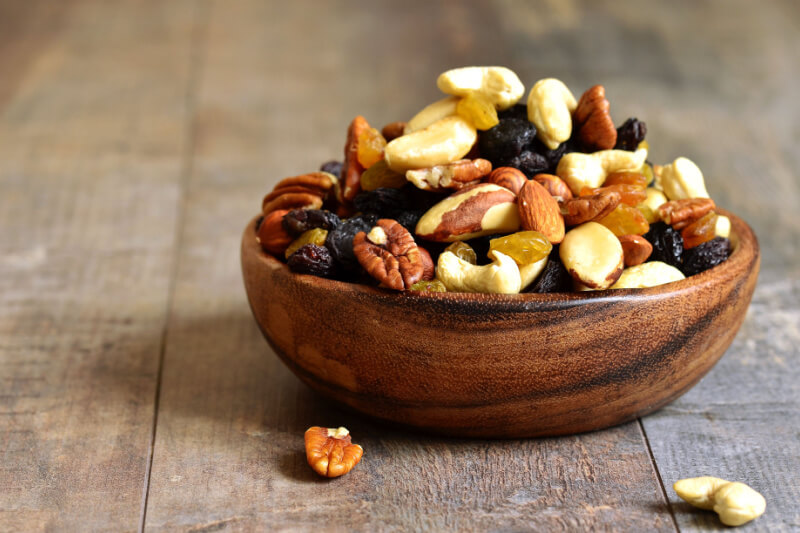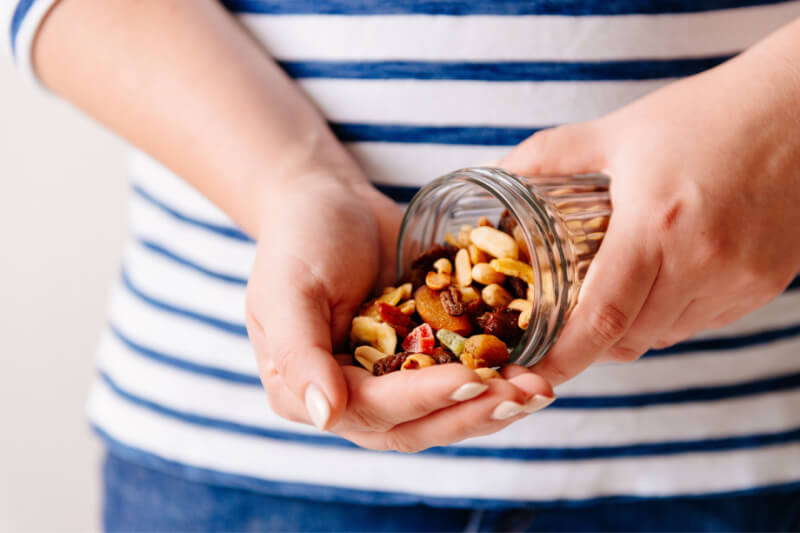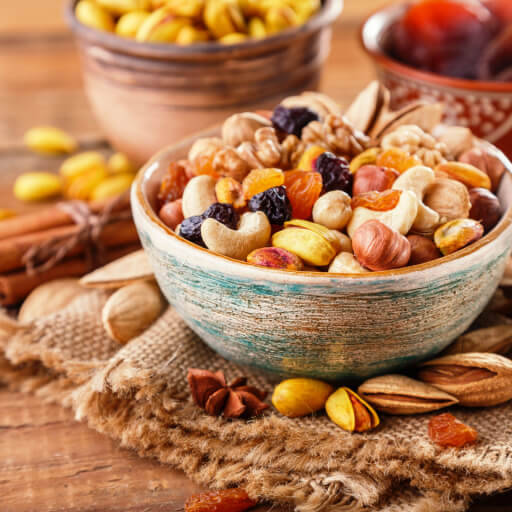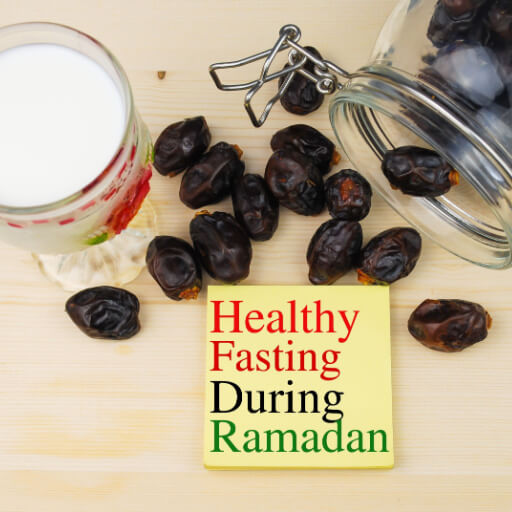While fruits and vegetables form a vital part of your diet, one should not undermine the importance of dry fruits. Small but mighty: Dry fruits pack a powerful nutritional punch.
इनके बारे में जानें:
Dry fruit is a form of dehydrated food, as most of its moisture content is removed naturally by keeping it under sun rays or through a dehydrator. The fruit shrinks during the process, leaving a small energy-dense fruit. Nuts and dry fruits retain most of the nutritional value of fresh fruit, making them highly beneficial for our bodies.
Different types of dry fruits

Dry fruits are an excellent source of all the essential nutrients. Dry fruits are rich in potassium, magnesium, calcium, zinc, phosphorus, and vitamins A, D, B6, K1, and E. Some naturally occurring examples and dry fruits benefits include:
- Almonds: Almonds are the seeds of the prune tree. You can consume low-carb nuts in salted, unsalted, raw, or roasted form. Almonds keep your heart healthy, help you in weight management, and their sodium-free properties make them a healthy option for individuals with high blood pressure. For the best results, eat 3-5 soaked almonds every morning for a healthy body. They are also found in almond milk and almond butter, among others.
- Walnuts: Walnuts are a nutrient-dense, single-seeded, hard-stone-like fruit. They contain omega-3 fatty acids, proteins, antioxidants, vitamins, and minerals, which keep your heart healthy. The unique texture of a walnut resembles a brain, which reflects its brain-sharpening properties. It improves cognitive performance in adults and can reduce age-related cognitive decline. Walnuts can be eaten raw or roasted and are commonly used in salads, baked goods, and as a topping for oatmeal or yogurt. Eating a minimum of 4 and a maximum of 7 walnuts a day can help cure many diseases.
- Cashews: Cashews are a part of many Indian meals owing to their creamy texture and delicious taste. Cashews contain high amounts of healthy monounsaturated fats, antioxidants, and polyphenols, which reduce inflammation and boost immunity. The magnesium, protein, and vitamins E and B6 content in cashews can lower bad cholesterol levels. The recommended serving size of cashews is about 28 grams, which is equivalent to 18 cashews.
- तिथियां: Dates are the fruits of the palm tree. Dry dates are replete with dietary फाइबर, which keeps you full for a long time. They are a rich source of iron which can prevent anemia and boosts hemoglobin. Most commonly consumed during winter, you can have dates in smoothies or breakfast with milk. 5-6 dates are advisable for your health. Don’t overdo it, as it can raise blood sugar लेवल.
- Pistachios: Pistachios are a good option for individuals who snack often. The hard shell enclosure covering protects the seed. They are an abundant source of micro and macronutrients, like carotenes, copper, magnesium, potassium, calcium, iron, zinc, oleic acid, and polyphenolic antioxidants. Pistachios are rich in vitamin A, a type of carotenoid that can improve eyesight. They are used popularly in flavored milk and milkshakes. Consume 1-2 handfuls of pistachios a day, not more, because they are high in calories.
- Hazelnuts: Hazelnuts are tree nuts that have a nutty, sweet, and crunchy flavor. They are consumed either raw, roasted, or ground in a paste to be used as dips. Hazelnuts contain vitamins, minerals, fats, and proteins that may improve your heart health. You can include a recommended serving of 15-20 hazelnuts in your meal. However, weigh your portions carefully if you tend to keep track of your calorie intake.
- Prunes: Prunes are dried plums with a plethora of health benefits. They are high in sugar content which can help satiate your sugar rush. They have vitamins A and K, fats, and carbs in abundance. You can consume 5-6 prunes a day.
- Figs: Dried figs are mildly sweet and packed with many nutritional benefits. They work wonders for individuals suffering from respiratory or reproductive issues. Soak around 3 figs overnight and consume them in the morning.
- Raisins: Raisins are dried grapes with a wrinkled appearance. They have high iron content, which can help fulfill iron deficiency. Raisins can be used as a topping on yogurts, cereals, and trail mix. Your daily raisin intake can include around 8-10 raisins. Excessive consumption can affect your digestive health.
- Dried apricot: Vitamins A and E, magnesium, and copper obtained from dried apricots are essential nutrients that suppress hunger. It is also full of antioxidants that can help fight against internal infections. You can consume 3-4 dried apricots a day.
Health benefits of dry fruits
Take a look at the many benefits of dry fruits:
- Boosts energy: Due to their high-calorie content, dry fruits are a great energy source. Eating a handful of dry fruits can help you stay energized throughout the day.
- Boosts immunity: Dry fruits are rich sources of essential oils, potassium, proteins, and calcium that boosts our immunity. They are also loaded with antioxidants that strengthen your body’s ability to fight illnesses and infections.
- Weight management: Dry fruits are high in fiber, making you feel satiated for a long time, thereby preventing overeating. They are low in fats, carbohydrates, sugar, and calories which aids you in weight management.
- Improve bone health: Dry fruits have an abundance of calcium, magnesium, boron, and vitamin K. Since our skeletal structure is full of calcium, these nutrients influence our bone health and prevent bone-related issues.
- Improves heart health: Dry fruits, like almonds, pistachios, and walnuts, are rich in healthy fats like monounsaturated and polyunsaturated fats, which help lower LDL cholesterol levels and improve cardiovascular health.
- Prevent cancer: The antioxidants and phytonutrients in almonds and cashew nuts prevents the activity of cancer-causing cells, which can reduce the risk of breast cancer. The fiber content in dry fruits promotes healthy digestion to avoid colon cancer. Fiber also removes toxins and waste from the body, reducing the risk of other types of cancers.
- Maintain digestive health: The dietary fiber in dry fruits फायदे your gut health and fights against constipation.
- Fights against anemia: Raisins and prunes are good sources of iron, especially for those suffering from anemia. Vitamins A, B, and K, minerals like copper and magnesium, and the unsaturated fats in dry fruits help regenerate red blood cells and hemoglobin in the body.

You can preserve dry fruits for a long time. They make for a healthy snack, particularly for long trips where refrigeration is not available. Dry fruits can make for a handy office snack. Instead of bingeing on junk food, keep a box of dry fruits in your desk drawer and munch on them when you feel hungry.
A handful of dry fruits is enough to meet one’s daily needs. An unhealthy amount of consumption of dry fruits is not suitable for your health. Other varieties of dried fruits, including apples, pineapples, mangoes, bananas, and cranberries, are also available in the form of sugar-coated candies. Added sugar or dry fruits coated in syrup before being dried have a harmful effect on your health, which can be linked to an increased risk of obesity, दिल की बीमारी, डायबिटीज, or cancer.
Stay tuned to the Activ Living Community. Keep up to date with the latest health tips and trends through expert videos, podcasts, articles, and much more in nutrition, fitness, mindfulness, and lifestyle conditions like Asthma, Blood Pressure, Cholesterol, and Diabetes.
You may also want to read similar blogs on:
- You are what you eat. Choose a healthy balanced diet today, और
- Benefits of dates to lead a healthy life





 1800-270-7000
1800-270-7000








